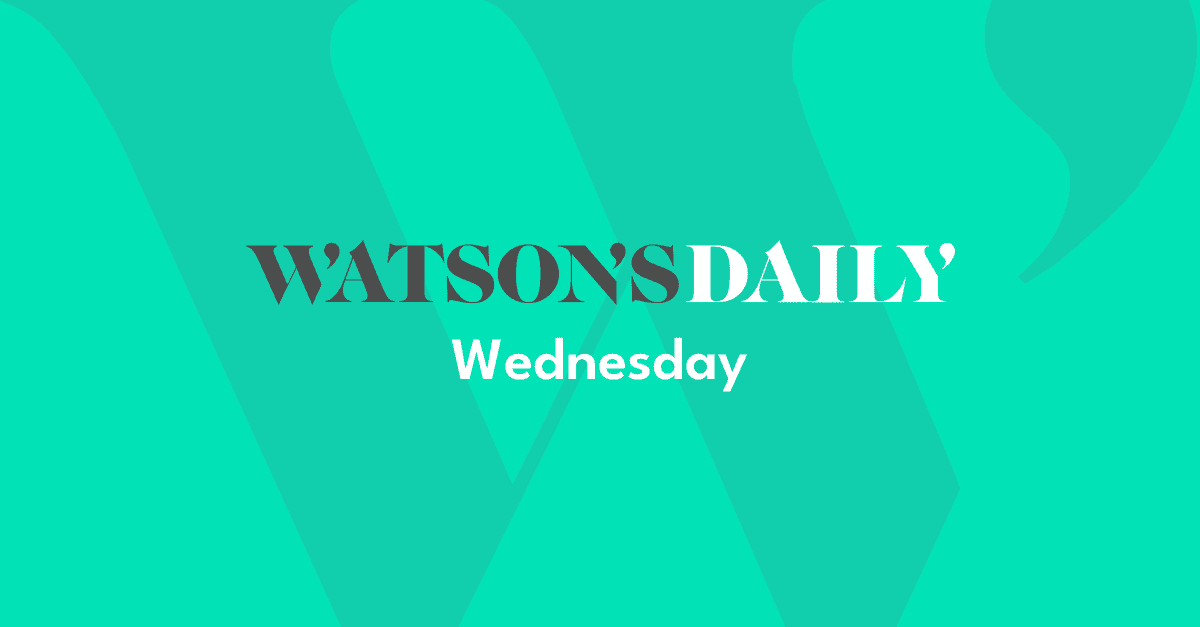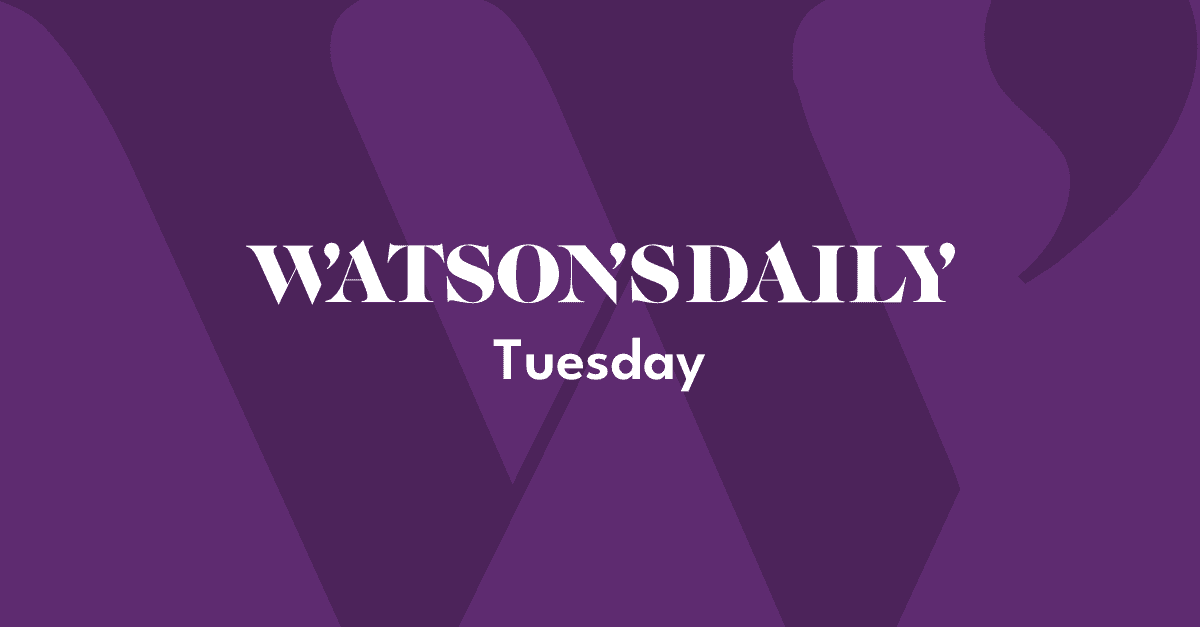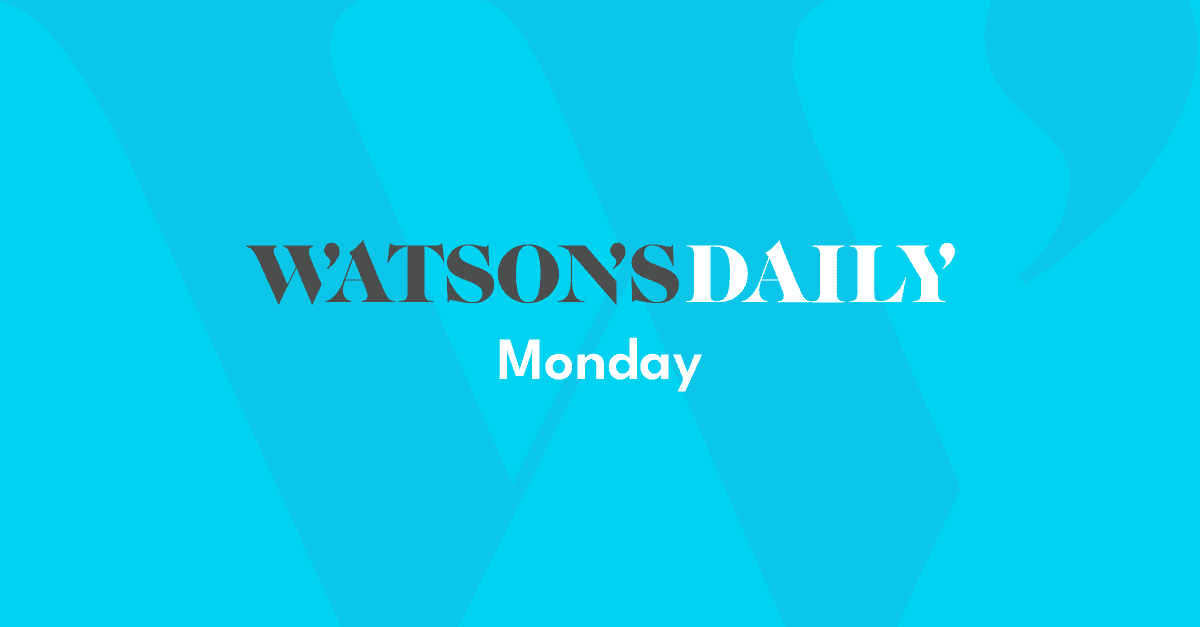Would you prefer to listen to Watson's Daily?
Click below to hear me read it. No AI here 😉!!!
IN BIG PICTURE NEWS
The BBB passes, US jobs growth exceeds expectations and the UK recovers
House of Representatives approves ‘big, beautiful bill’ in victory for Donald Trump (Financial Times, James Politi, Lauren Fedor and Myles McCormick) shows that Trump managed to get his flagship tax and spend legislation through the House of Representatives in a 218 to 214 vote, quashing rebellion along the way. The bill continues the tax cuts Trump implemented in his first term and dismantles Biden’s tax credits for clean energy. There are big cuts to Medicaid and other social welfare programmes along with an increase in military spending and a crackdown in immigration. Donald Trump’s ‘big, beautiful bill’ provides windfall for US immigration crackdown (Financial Times, Guy Chazan) highlights what the White House boasted as being the “largest investment in border security in a generation” that would channel “nearly $150bn to secure our border and deport illegal aliens”. Somewhat incredibly, the sum that will be allocated to the US Immigration and Customs Enforcement (ICE) will be more money on an annual basis combined for the next four years than the budges of the FBI, DEA, Bureau of Alcohol, Tobacco, Firearms and Explosives, the US Marshals Service and the Federal Bureau of Prisons. And for good measure, it’s nigh on double the UK’s defence budget 😱! This means that ICE will be able to hire 10,000 agents, 5,000 customs officers and 3,000 border patrol agents. Since Trump took the reins at the White House in January, ICE has deported over 200,000 people. Clearly, more immigration raids are going to happen across the country…Meanwhile, The Corporate Winners and Losers in Trump’s Big Tax Bill (Wall Street Journal) highlights winners in the bill as including fossil fuel companies (they can buy more public land in Alaska and the Gulf of Mexico, lower royalty rates), Silicon Valley investors (they can sell more of their holdings early without having to pay CGT), chipmakers (higher tax credits for new plants), defence contractors (loads more big projects, including the Golden Dome), airlines (money going towards overhauling the air traffic control system), private schools (tax credits for those attending private schools), sports team owners (averted a financial hit involving deductions for intangible assets), private equity (avoided having to pay tax on carried interest income), manufacturers (they’ll get tax breaks to help domestic manufacturing), real estate developers (preserves and broadens existing tax breaks for commercial and real estate investors and developers), private student lenders (lower federal student-loan caps which means that more students will have to borrow money) and retailers (no change to corporate income tax rate). Losers include AI and tech companies (AI will be subject to state-level regulation), EVs (no more subsidies), solar and wind (developers won’t be able to qualify for special tax credits in 12 months’ time), shippers and online retailers (end of the de minimis rule), food companies (cuts to America’s food stamp programme), universities (annual investment income gets taxed, although small colleges are exempt) and hospitals (states won’t be able to boost Medicaid payments to hospitals). Trump has dropped a big, beautiful bomb on America’s economy (Daily Telegraph, Ambrose Evans-Pritchard) contends that the bill has effectively handed China global leadership of the electro-tech revolution and “much of the future global market for cars, trucks, short-haul aviation, home heating and cooling, smart grids, power storage” as well as products that deliver cheap energy. People at think tank Ember estimate that China is electrifying its economy at about 10 percentage points every ten years – and it’s already broken through 30% while the US has been in the low 20s since 2008 thanks to the fracking boom. America is now doubling down on fossil fuels and trying to force the likes of Japan, South Korea and Europe to increase imports of US LNG while Trump is trying to force the EU to change its laws to accommodate. Fun facts: two-thirds of of fossil energy is lost to the atmosphere in the form of heat whereas about 90% of electric energy is used in its final function. Meanwhile, Trump’s bill is actively hobbling new technologies with the exception of geothermal and nuclear fusion. Energy Innovation reckons that the bill will mean that America will generate 340gigawatts less over the next ten years and push wholesale electricity prices 74% higher. This could mean that there won’t be enough electricity to meet new data centre demand, which will limit America’s AI ambitions. He’s also torpedoing America’s EV industry at a time when China makes 75% of the world’s electric batteries and 70% of its EVs. * SO WHAT? * In a world where 80% of the population inhabit countries that are net importers of fossil fuels, the incentives to wean themselves off in favour of much cheaper – and cleaner – electricity will only grow over time. Until then, they’ll buy Chinese solar panels (which are cheap currently – and will get cheaper!), drive around in Chinese EVs and ultimately wean themselves off fossil fuels leaving America carrying the fossil fuel jerrycan. Oil producing countries, like Saudi Arabia, are already
using oil revenues to wean themselves off fossil fuels – so it seems ironic that America’s looking to go in the opposite direction. Has Trump just dropped a big beautiful bomb on the future prospects of his own country? As far as the rest of the BBB goes, I have to say that I think that the gargantuan increase in funding for ICE is at once pretty incredible but also frightening. It feels like Trump’s America is turning in on itself and making itself an echo chamber for the administration whilst also using force to make other countries bend to its will using a combination of tariff and defence threats. Ultimately, this will mean that countries will not trust America, will increasingly exclude it as much as possible and become much more self-reliant. Although this won’t be possible in the short term, I think that in the longer term this is the direction that governments will be aiming. In a way, maybe Trump has inadvertently done the whole world a favour. For the next few years, though, I think it’ll be a rocky ride for all concerned.
Elsewhere, Trump tries to sell rice to the Japanese (Daily Telegraph, Hans van Leeuwen) highlights the president’s attempt to make Tokyo buy more American rice. Earlier this week, Trump said on Truth Social that “Japan, they won’t take our RICE, and yet they have a massive rice shortage” and later branded the Japanese people as “spoilt” for not taking American rice. This has been a major hurdle to broader trade negotiations. Rice prices have quadrupled over the last year thanks to a heatwave-hit harvest, rising demand from restaurants who are seeing more tourists and panic buying. * SO WHAT? * One thing I learned (among many other things!) from my years of living in Japan was just how seriously Japanese take their rice. When I was a student (yes, it was a loooooong time ago!), I remember that there was a harvest problem and there were bags and bags of cheap Thai rice at the supermarkets that seemed to be untouched next to the empty spaces where the Japanese rice would have been. I seem to remember that the bags of Japanese rice were many times more expensive (I think almost ten times, but my memory could have faded on that) than the Thai rice but it seemed that Japanese just wouldn’t touch it. Also, it is a right of passage for pretty much all school kids to go on school trips to rice paddies to see how rice is grown and harvested and there is even a saying that exhorts people not to waste it – “in a grain of rice lives seven gods” – so you can see where all this comes from. Still, America can grow quite decent rice (California is known for its “japonica” rice that closely resembles what you get in Japan) but I think it could be a harder sell than Trump thinks given how much national fervour is stirred when it comes to rice. In a way, I think that the government should cave on this in order to get a trade deal done because it may well be that the Japanese public is so incensed by Trump’s treatment that they won’t buy it as a matter of principle.
Then in US jobs growth beats expectations in June (The Times, Louisa Clarence-Smith and Simon Freeman) we see that the US Department of Labor released strong jobs data yesterday, which prompted optimism about the US economy and lifted markets. Unemployment fell from 4.2% to 4.1% while average earnings increased by 0.2% month-on-month. * SO WHAT? * At the moment, it seems that the negative effects of Trump’s tariffs are so far not as bad as everyone has expected and you would have thought that his new bill will prompt growth at least in the short term (although it will surely increase the country’s debt). Things certainly seem to be going Trump’s way at the moment…
Back home, Markets rally after Starmer says Reeves to remain chancellor and backs fiscal rules (Financial Times, Ian Smith, Jim Pickard and Emily Herbert) shows that bond markets recovered after Reeves’s wobble the other day following reassurances by Starmer that she’d be the chancellor for a “very long time to come”. Investor fright over Reeves’ tears shows fragility of UK finances (Financial Times, Ian Smith, Sam Fleming, Jim Pickard, Harriet Clarfelt and Kate Duguid) says that the market reaction highlights just how fragile investor confidence is regarding our country’s finances.
UK services sector grows at fastest rate in 10 months (The Times, Mehreen Khan) sounds a positive note as the latest services sector PMI showed that output hit a ten-month high thanks to more new orders. This may embolden the Bank of England to cut interest rates, something that markets are expecting at the Bank of England’s meeting in August. It looks like things are recovering after the shock of April…
IN TECH NEWS
The US lifts chip software restrictions and the UK considers how to use data assets
In Chip software makers say US restrictions on sales to China lifted (Financial Times, Thomas Hale and Christian Davies) we see that the US has now removed recent restrictions imposed on sales to China thanks to a US-China trade deal. The US government told Siemens, Synopsys and Cadence – who together account for 80% of China’s market for electronic design automation software which is used to develop new semiconductors – that exports restrictions imposed in May had been lifted. * SO WHAT? * This is good news for the companies, but you would have thought that Chinese rivals will be innovating like mad to make sure they don’t get caught out again! The software ban had been in response to China cutting down on the shipment of rare earths. This may ease the proposed $35bn merger between Synopsys and engineering software developer Ansys because Chinese regulators had been dragging their feet in response to America’s ban on chip design software sales to China.
Then in Dinosaurs to doctors’ records: the UK weighs up its data assets (Financial Times, Lex) we see that the UK government is in a bit of a quandary at the moment because it wants to sell anonymised public data. However, pricing it is difficult because it has different value to different buyers and timing can also have an impact (newer data is generally more valuable than older data). One way that is popular with the likes of Bloomberg, Nielsen and Gartner is the subscription model. However, this doesn’t take all the costs of collating that information and interpreting it into consideration so there is an argument for some kind of marketplace/exchange. There are various such exchanges in China, like the Guiyang Global Big Data Exchange, but there’s also the possibility that Big Tech companies could get involved as well. Given their expertise at splicing and dicing data, perhaps it would be better to supply the data to these companies who can do more with it than the UK government can. That is assuming, of course, that there are no security issues!
IN RETAIL NEWS
Shein gets a fine in France and Watches of Switzerland posts record revenues
Shein hit with €40mn fine in France over misleading discounts (Financial Times, Adrienne Klasa and Barbara Moens) shows that Shein has just been slapped with a €40m penalty by French regulators for misleading consumers on price cuts and environmental commitments. The regulator came to this conclusion after an 11-month investigation. * SO WHAT? * Although this is a record fine, the fact that it made $1bn in net profit from revenues of $38bn in 2024 puts the $40m fine into context. I’m guessing that Shein will just shrug its shoulders at this and carry on with plans for its mega-flotation in Hong Kong. That being said, Shein is at the centre of many investigations going on in Europe. As you know, I have been sceptical about Shein’s flotation in London because I think that it is a massive litigation risk – so when it turned out that it was going to list in Hong Kong I thought we’d dodged a bullet.
Meanwhile, in Watches of Switzerland posts record revenue but profits slide (The Times, Isabella Fish) we see that it was a bit of a mixed bag for the posh watch seller as it reported a record year for sales on the one hand but then warned that profit margins would be hit by US tariffs on the other. Overall it expected adjusted earnings for the year to be flattish. All of the brands it sells – including the likes of Rolex, Patek Philippe, Omega and Tag Heuer – had increased prices in the mid-single digits. * SO WHAT? * It seems that there was underlying strength in trading powered by demand for Rolex watches and US growth. It’s doing OK at the moment, but I guess a lot will depend on consumer confidence and more people travelling.
IN MISCELLANEOUS NEWS
EV take-up increases and first-time buyers target regional cities
In a quick scoot around some of today’s other interesting stories, Electric cars sales account for a quarter of UK registrations (The Times, Robert Lea) cites the latest figures from the New AutoMotive consultancy, which came out before the SMMT’s data release, which show that 25% of new cars registered in June ran only on electric batteries. This has been helped by bigger monthly shipments from Tesla, growing competition from the Chinese and legacy European carmakers upping the ante on EV production. It’s estimated that there are over 100 all-electric car models currently on the market. Tesla is still the market leader but BMW and VW are close behind!
Then in First-time buyers turn from rural areas to Britain’s regional cities (The Guardian, Rupert Jones) we see that there’s an interesting change of consumer behaviour taking place, according to the interpretation of data from Rightmove! The analysis suggests that the number of would-be first-time buyers in Great Britain seeking to move to cities is up by a chunky 16% on average versus the same period in 2015. After the escape to the countryside under lockdown, it seems that people are increasingly succumbing to the pull of the cities. The top five were Dundee, Edinburgh, Doncaster, Liverpool and Plymouth.
...AND FINALLY...
...in other news...
I have to say I’m not convinced about this – frying pasta dry before you put the water/stock in – but I have pan-fried gnocchi before and that was a revelation! BTW, I’ve never put stock in pasta either (always salted water). What do you reckon? Yay or nay??
Some of today’s market, commodity & currency moves (as at hrs green is up, red is down). THIS IS INTENDED AS A ROUGH GUIDE ONLY!
| FTSE 100 * | Dow Jones * | S&P 500 * | Nasdaq* | DAX * | CAC-40 * | Nikkei ** | Shanghai ** |
| Oil (WTI) p/b | Oil (Brent) p/b | Gold Per t/oz | £/$ | €/$ | $/¥ | £/€ | $/₿ |
(markets with an * are at yesterday’s close, ** are at today’s close)









